What exactly triggered the Boston Tea Party in 1773?
The Boston Tea Party is a pivotal event in American history, marking a significant escalation in the conflict between the American colonists and British authorities leading up to the American Revolution. The event demonstrated strong defiance against British rule and showcased the colonists’ willingness to take action against what they perceived as unjust laws and taxation. We shudder to think what would have happened had those American colonists not dumped those chests of British tea into the Boston Harbor.
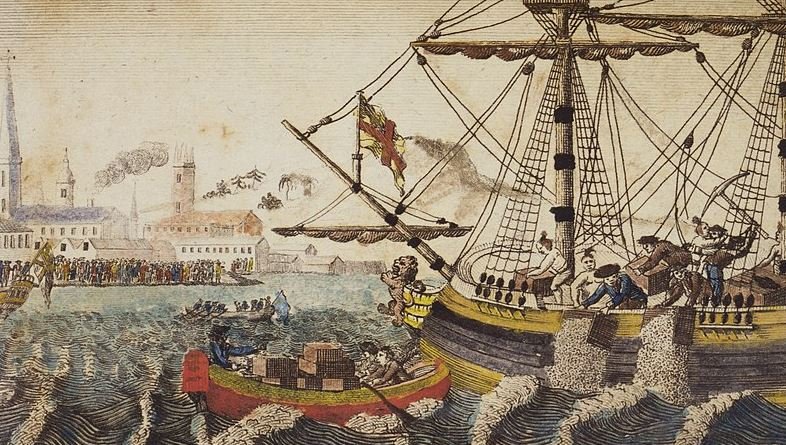
The Boston Tea Party escalated tensions between Britain and the American colonies, leading to the imposition of the Coercive Acts (also known as the Intolerable Acts) by the British Parliament, which further united the colonies against British rule and paved the way for the American Revolution.
This is the story of the major cause of the Boston Tea Party.
Economic Factors that triggered the Boston Tea Party
The roots of the Boston Tea Party can be traced back to the complex economic relationship between the British Empire and its colonies. In the 18th century, the British economy relied heavily on its American colonies, which provided raw materials to the mother country and served as markets for British manufactured goods.
However, the British government’s attempts to regulate and control colonial trade through a series of acts, including the Navigation Acts, created resentment among American colonists. These laws were designed to ensure that the lucrative trade with the colonies benefited Britain, often at the colonists’ expense.
The economic strain on the British government was exacerbated by the French and Indian War (1754–1763), known in Europe as the Seven Years’ War. The war was costly, and in its aftermath, the British government faced a massive national debt. Seeking to alleviate its financial burdens, Parliament decided to impose new taxes on its American colonies, which it believed had benefited most from the war.
Political Factors
One of the first direct taxes imposed by the British Parliament on the colonies was the Stamp Act of 1765, which required that many printed materials in the colonies be produced on stamped paper produced in London, carrying an embossed revenue stamp. This act was met with fierce opposition in the colonies, leading to its repeal in 1766.
However, Parliament simultaneously passed the Declaratory Act, asserting its right to legislate for the colonies “in all cases whatsoever.”
The imposition of subsequent taxes, such as the Townshend Acts of 1767, which placed duties on various imported goods, including tea, further inflamed tensions. The colonists’ resistance to these acts was based on the principle of “no taxation without representation.”
Since the colonies had no representation in the British Parliament, they argued that Parliament had no right to tax them. This slogan became a rallying cry for American resistance against British taxation policies.
Ideological Factors
The ideological underpinnings of the colonial resistance were deeply rooted in Enlightenment principles, which emphasized individual rights, liberty, and democracy. Many colonists believed that British taxation and trade policies infringed upon their rights as Englishmen.
The growing sentiment in the colonies was that British rule had become tyrannical and that the colonists were justified in resisting its authority.
The spread of these ideas was facilitated by the proliferation of pamphlets, newspapers, and other forms of communication that criticized British policies and promoted colonial unity. Figures such as Samuel Adams and the Sons of Liberty played a crucial role in organizing resistance against British actions and in fostering a sense of American identity that was distinct from British colonial rule.
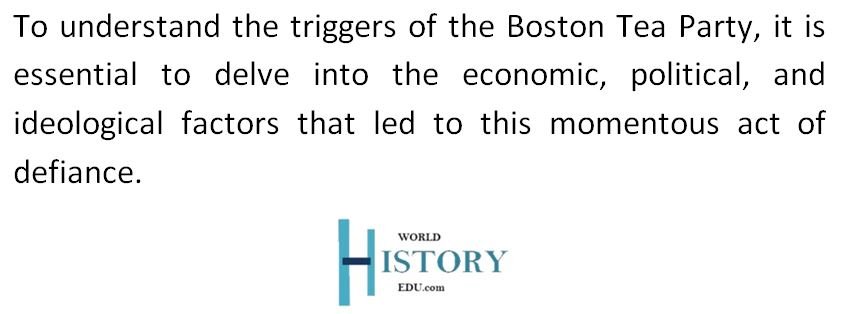
The Tea Act of 1773
The immediate trigger for the Boston Tea Party was the Tea Act of May 1773. This act was intended to rescue the financially troubled British East India Company by granting it the right to sell its surplus tea directly to the colonies, free of the taxes that colonial tea sellers were required to pay. This would allow the company to undercut the prices offered by colonial merchants, effectively granting it a monopoly on the American tea trade.
The Tea Act reignited the colonists’ anger over taxation without representation, as it was seen as another example of Parliament’s arbitrary imposition of taxes. The act also threatened the livelihoods of colonial merchants and smugglers who had been profitably trading in tea.
The Spark
The situation reached a boiling point in late 1773 when ships laden with East India Company tea arrived in several American ports, including Boston. The colonists demanded that the tea be returned to England without paying the import duties.
In Boston, Governor Thomas Hutchinson refused to allow the ships to leave without first unloading their cargoes, effectively challenging the colonists to take action.
On the evening of December 16, 1773, a group of colonists, some disguised as Mohawk Indians to hide their identities, boarded the ships anchored in Boston Harbor. In a dramatic act of defiance, they threw 342 chests of tea into the water, an event that would come to be known as the Boston Tea Party.
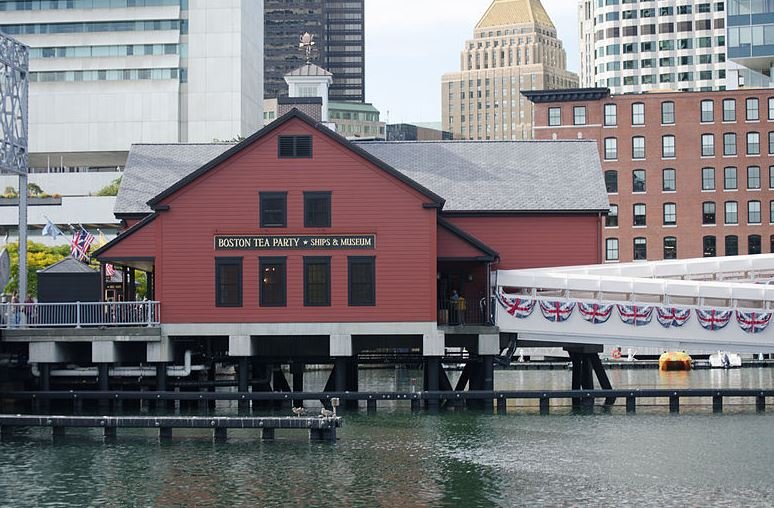
The Boston Tea Party of 1773 was not a spontaneous event but rather the culmination of a series of conflicts and legislative actions that heightened tensions between Great Britain and its American colonies. Image: The Congress Street Bridge in Boston, Massachusetts is home to the Boston Tea Party Museum.
Frequently Asked Questions
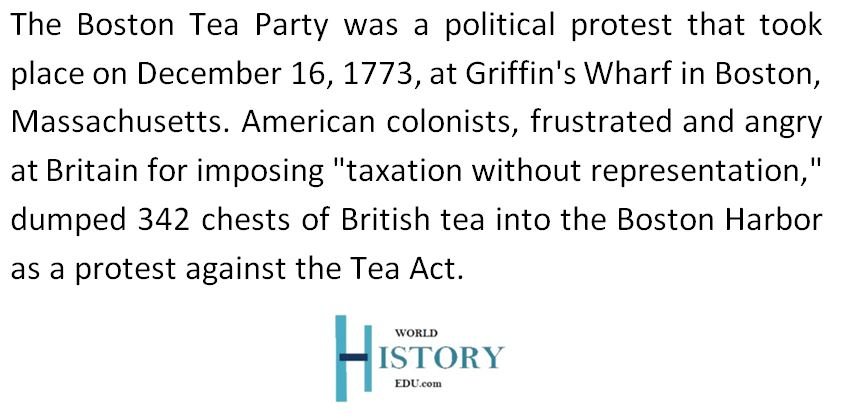
Why did the Boston Tea Party happen?
The Boston Tea Party occurred as a response to the Tea Act of 1773, enacted by the British Parliament. The act was intended to bail out the struggling East India Company and expand its monopoly on the British tea trade to the American colonies.
The legislation allowed the East India Company to sell tea directly to the colonies, bypassing colonial merchants and undercutting their prices. American colonists saw the act as another example of taxation tyranny since they had no representation in Parliament.
What was the significance of the Boston Tea Party?
The Boston Tea Party was significant because it was a bold demonstration of defiance against British rule and showcased the colonists’ willingness to take action against what they perceived as unjust laws and taxation. The event escalated tensions between Britain and the American colonies, leading to the imposition of the Coercive Acts (also known as the Intolerable Acts) by the British Parliament, which further united the colonies against British rule and paved the way for the American Revolution.
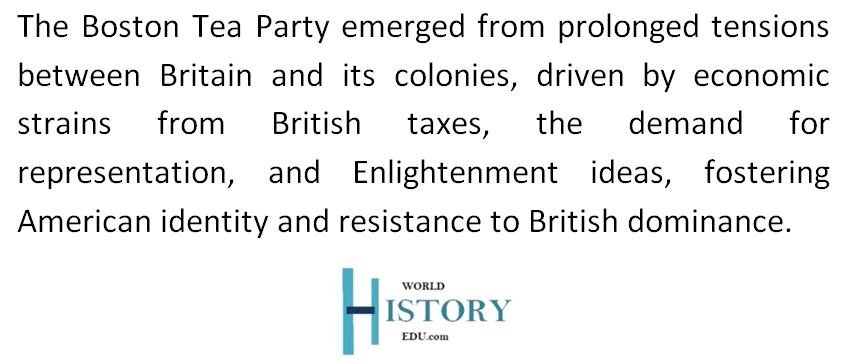
What were the consequences of the Boston Tea Party?
In response to the Boston Tea Party, the British government enacted the Coercive Acts in 1774. These acts closed Boston Harbor until the tea was paid for, altered the Massachusetts charter to reduce democratic town meetings, and allowed royal officials accused of crimes in the colonies to be tried in Britain or another colony. These punitive measures were meant to make an example of Massachusetts but instead galvanized resistance across the colonies.
Who participated in the Boston Tea Party?
The participants of the Boston Tea Party, known as the “Sons of Liberty,” were a group of colonial merchants, artisans, and professional men who organized and carried out the tea’s destruction. Many participants disguised themselves as Mohawk Indians to hide their identities and to symbolize an American identity distinct from British colonialists.
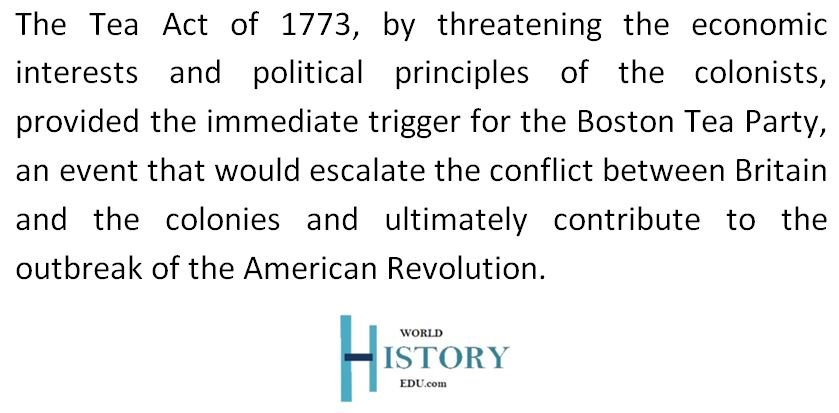
How did the British government respond to the Boston Tea Party?
The British government’s immediate response to the Boston Tea Party was the enactment of the Coercive Acts in 1774, which were intended to punish the Massachusetts colonists for their defiance and restore British authority. The Acts only served to inflame tensions and unite the colonies further against British rule.
What happened to the tea that was dumped in the harbor?
The 342 chests of tea, belonging to the British East India Company, were thrown into the Boston Harbor, where the tea leaves were soaked and ruined, rendering them unsellable. The total value of the destroyed tea would have been a significant sum at the time, estimated to be around £9,000 (a considerable amount in the 18th century).
How is the Boston Tea Party remembered today?
The Boston Tea Party is remembered as a seminal event in American history that contributed to the outbreak of the American Revolution. It is celebrated for its role in American independence and is often cited as an example of civil disobedience and protest against government overreach. Various museums, historical reenactments, and educational programs continue to commemorate the event.
What were the names of ships involved in the Boston Tea Party?
The Boston Tea Party involved three ships: the Dartmouth, the Eleanor, and the Beaver. These ships were anchored in Boston Harbor and were loaded with tea from the British East India Company. On the night of December 16, 1773, American colonists, disguised as Mohawk Indians, boarded these vessels and dumped the tea cargo into the harbor as a protest against the Tea Act and British taxation policies.
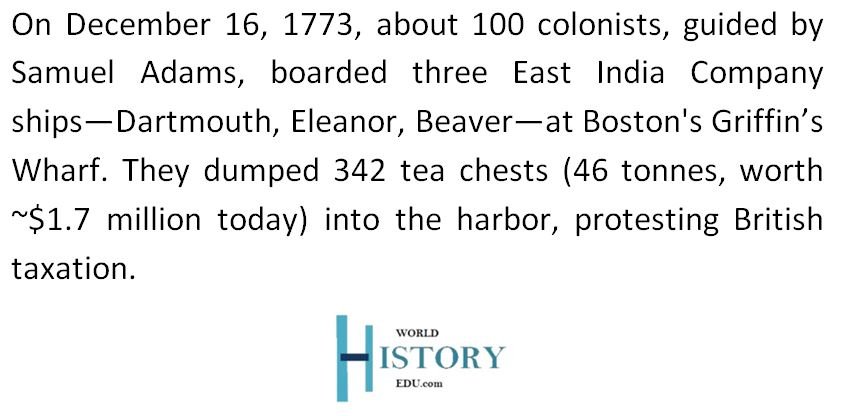
Did the East India Company receive any reimbursement?
The East India Company did not receive any reimbursement or compensation from the British government or the American colonists for the loss of tea during the Boston Tea Party.
The British government’s response to the incident was not to compensate the company but rather to punish the colonies, particularly Massachusetts, for the act of defiance. This led to the implementation of the Coercive Acts (also known as the Intolerable Acts in America), which included measures such as closing Boston Harbor until the tea was paid for and altering the Massachusetts Charter to reduce colonial self-governance.
The acts passed by Parliament further escalated tensions between Britain and the American colonies, contributing to the onset of the American Revolutionary War. The financial loss incurred by the East India Company from the destroyed tea was significant, but the political consequences of the Boston Tea Party proved to be even more impactful.
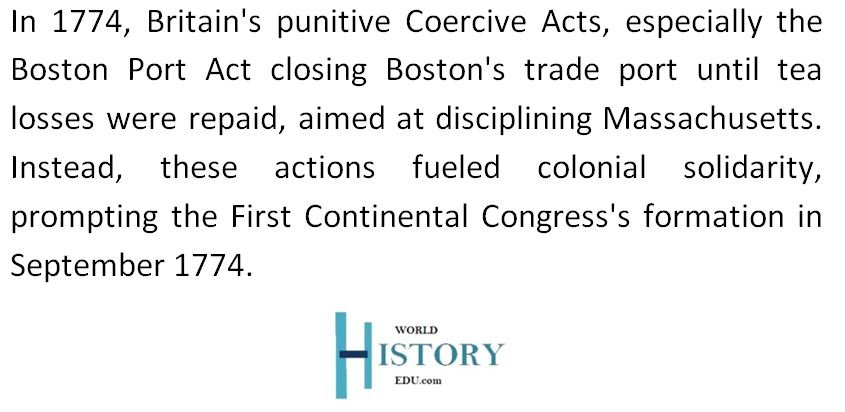
How did the Boston Tea Party result in the formation of the First Continental Congress?
The Boston Tea Party directly contributed to the formation of the First Continental Congress due to the British government’s reaction to the event. In response to the destruction of tea in Boston Harbor, the British Parliament enacted a series of punitive measures known as the Coercive Acts in 1774, intended to punish Massachusetts and assert British authority. Key aspects of these acts included the Boston Port Act, which closed Boston Harbor until the tea was paid for, and other laws that altered the governance structure of Massachusetts, infringing upon colonial self-rule.
These harsh measures were viewed by the American colonies not just as a punishment for Massachusetts, but as a threat to all the colonies’ rights and liberties. The widespread outrage and solidarity among the colonies against the Coercive Acts led to the call for a collective response.
In September 1774, delegates from twelve of the thirteen colonies (Georgia did not participate) convened in Philadelphia for the First Continental Congress. Their main goals were to address colonial grievances over British policies, to restore the rights they felt were being undermined by British legislation, and to formulate a unified colonial response to the Coercive Acts. The Congress also facilitated intercolonial communication and cooperation, laying the groundwork for united action against British rule, which eventually led to the American Revolutionary War.
Thus, the Boston Tea Party, by provoking the British government to implement the Coercive Acts, indirectly led to the formation of the First Continental Congress as a platform for collective colonial action and resistance.
Why was the event later called the Boston Tea Party?
The ‘Boston Tea Party’ term emerged in print around 1826, gaining popularity in the 1830s to describe the 1773 event where colonists dumped tea into Boston Harbor as a protest. Initially used perhaps satirically or to minimize the act’s violent connotations, the name now symbolizes American resistance against British taxation without representation.
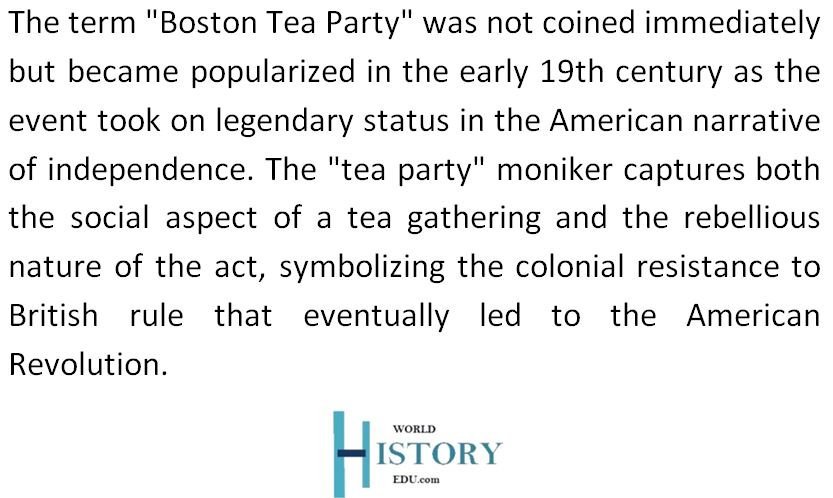
These FAQs cover the basics of the Boston Tea Party, but if you have more specific questions or need further information, feel free to ask in the comment section below.



























